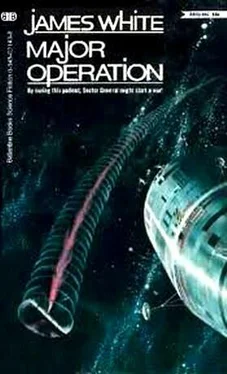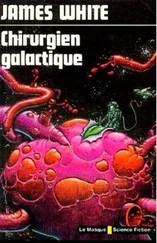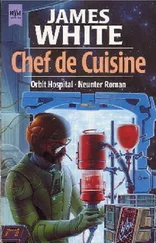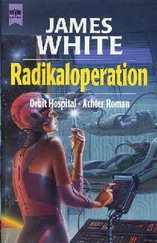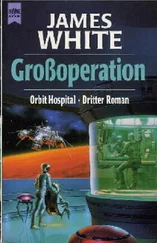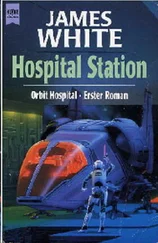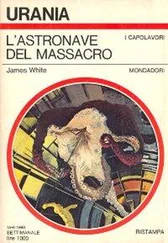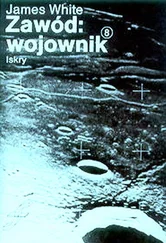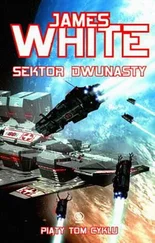Certain areas could not be treated surgically, of course, for the same reason that Shylock had to forego his pound of flesh. These were relatively small trouble spots far inland, whose condition was analogous to a severe skin cancer, but limited surgery and incredibly massive doses of medication were beginning to show results.
“But I still don’t understand its hostility toward us,” Murchison said nervously as the ship went into a three-dimensional skid and lost a lot of height. “After all, it can’t possibly know enough about us to hate us like that.”
The ship was passing over a dead area where the eye plants were discolored and lifeless and did not react to their shadow. Conway wondered if the vast creature could feel pain or if there was simply a loss of sensation when parts of it died. In every other life-form he had ever encountered, and he had met some really weird ones at Sector General, survival was pleasure and death brought pain-that was how evolution kept a race from just lying down and dying when the going got tough. So the strata creature almost certainly had felt pain, intense pain over hundreds of square miles, when the rollers had detonated their nuclear weapons. It had felt more than enough pain to drive it mad with hatred.
Conway cringed inwardly at the thought of such vast and unimaginable pain. Several things were becoming very clear to him.
“You’re right,” he said. “They don’t know anything at all about us, but they hate our shadows. This one in particular hates them because the aircraft carrying the sea-rollers’ atomic bombs produced a shadow not unlike ours just before large tracts of the patient’s body were fried and irradiated.”
“We land in four minutes,” said Harrison suddenly. “On the coast, I’m afraid, because this bucket has too many holes in it to float. Descartes has us in sight and will send a copter.
The pilot’s face made Conway fight the urge to laugh. It looked like that of a half made-up clown. Furious concentration had drawn Harrison’s brows into a ridiculous scowl while his lower lip, which he had been chewing steadily since takeoff, was a wide, blood-red bow of good humor.
Conway said, “The tools can’t operate in this area and, except for a little background radiation caused by fallout, there is no danger. You can land safely.”
“Your trust in my professional ability,” said the pilot, “is touching.” From their condition of unlevel flight they curved into a barely controlled, tail-first dive. The surface crept, then rushed up at them. Harrison checked the rush with full emergency thrust. There were metallic tearing noises and the rest of the lights on his board turned red.
“Harrison, pieces of you are dropping off …” began Descartes’ radioman, then they touched down.
For days afterward the observers argued about it, trying to decide whether it had been a landing or a crash. The shock-absorber legs buckled, the stern section took some more of the shock as it tried to telescope amidships and the acceleration couches took the rest-even when the ship toppled, crashed onto its side and a broad, flickering wedge of daylight appeared in the plating a few feet away. The rescue copter was almost on top of them.
“Everybody out,” said Harrison. “The pile shielding has been damaged.”
Looking at the dead and discolored surface around them, Conway thought again of his patient. Angrily, he said, “A little more radiation hereabout won’t make much difference.”
“To your patient, no,” said the lieutenant urgently. “But perhaps selfishly I was thinking of my future offspring. After you.”
During the short trip to the mother ship Conway stared silently out of the port beside him and tried hard not to feel frightened and inadequate. His fear was due to reaction after what could easily have been a fatal crash plus the thought of an even more dangerous trip he would have to make in a few days’ time, and any doctor with a patient who stretched beyond the limits of visibility in all directions could not help feeling small. He was a single microbe trying to cure the body containing it, and suddenly he longed for the normal doctor-patient relationships of his hospital-even though very few of his patients or colleagues could be considered normal.
He wondered if it might not be better to have sent a general to medical school than to give a doctor control of a whole sector sub fleet.
Only six of the Monitor Corps heavies were grounded on Drambo, their landing legs planted firmly in the shallows a few miles off one of the dead sections of coastline. The others filled the morning and evening sky like regimented stars. His medical teams were grouped in and around the grounded ships, which rose out of the thick, soupy sea like gray beehives. The Earth-humans like himself lived on board while the e-ts, none of whom breathed air, were quite happy roughing it on the sea bed.
He had called what he hoped would be the final pre-op meeting in the cargo hold of Descartes, which was filled with Drambon sea water whose content of animal and plant, life had been filtered out so that the beam of the projector would have a sporting chance of fighting its way to the screen attached to the forward bulkheads.
Protocol demanded that the Drambons present opened the proceedings. Watching their spokesman, Surreshun, rolling like a great flaccid doughnut around the clear space in the center of the deck, Conway wondered once again how such a ridiculously vulnerable species had been able to survive and evolve a highly complex, technology-based culture- though it was just possible that an intelligent dinosaur would have had similar thoughts about early man.
Surreshun was followed by Garoth, the Hudlar Senior Physician who was in charge of the patient’s medical treatment. Garoth’s chief concern was with the devising and implementation of artificial feeding in areas where incisions would cut the throat tunnels between the coastal mouths and the inland prestomachs. Again unlike Surreshun, it did not say very much but let the projector do all the talking.
The big screen was filled by a picture of an auxiliary mouth shaft situated about two miles inland of the planned incision line. Every few minutes a copter or small supply ship grounded beside the shaft discharged its load of freshly dead animal life from the coastal shallows and departed while corpsmen with loaders and earth-moving machinery pushed the food over the lip. Possibly the amount and quality of the food was less than that which was drawn in naturally, but when the throat was sealed during the major operation this would be the only way that large areas of the patient could be supplied with food.
Aseptic procedures were impossible in an operation on this scale so that pumping equipment drawing sea water from the coast was drawn through large-diameter plastic piping. It poured in a steady stream- except when tools cut the pipeline-into the food shaft, supplying the strata creature with needed working fluid and at the same time wetting the walls so that leucocytes could be slipped down from time to time to combat the effects of any dangerous plant life which might have been introduced during feeding.
They were seeing a drill, of course, performed at one of the feeding installations a few days earlier, but there were more than fifty auxiliary mouths in a similar state of readiness strung out along the proposed incision line.
Suddenly there was a silvery blur of motion on the ground beside the pump housing and a corpsman hopped a few yards on one foot before falling to the ground. His boot with his other foot still in it lay on its side where he had been standing and the tool, no longer silvery, was already cutting its way beneath the blood-splashed surface.
“Tool attacks are increasing in frequency and strength,” said Garoth in Translated. “They are also displaying considerable initiative. Your idea of clearing an area around the feeding installations of all eye plants so that the tools would have to operate blind, and would have to bounce around feeling for targets, worked only for a short time, Doctor. They devised a new trick, that of sliding along a few inches below the surface, blind, of course, then suddenly extruding a point or a cutting blade and stabbing or swinging with it before retreating under the surface again. If we can’t see them, mental control is impossible, and guarding every working corpsman with another carrying a metal detector has not worked very well so far-it has simply given the tool a better chance of hitting someone.
Читать дальше
